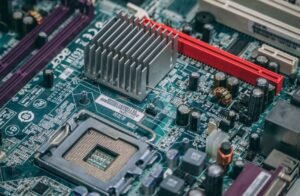AI Applications for Students
Artificial Intelligence (AI) is rapidly advancing and has implications in various fields, including education. As students adapt to a more technology-driven world, AI applications are becoming increasingly prevalent and impactful in enhancing their learning experience.
Key Takeaways
- AI applications provide personalized learning experiences for students.
- AI can assist in automating administrative tasks, allowing educators to focus more on teaching.
- Virtual tutors and chatbots powered by AI can provide real-time assistance and support to students.
- AI applications help in analyzing large amounts of data to identify student performance patterns and recommend improvements.
One of the key benefits of AI in education is its ability to offer personalized learning experiences. AI algorithms can analyze student performance, behavior, and preferences to create tailored educational content and pathways. This individualized approach enables students to learn at their own pace and focus on areas where they need improvement.
Moreover, AI can assist in automating various administrative tasks faced by educators. This includes grading assignments, managing attendance, and generating reports. By implementing AI applications for such tasks, educators can save valuable time and focus more on their core responsibilities – teaching and mentoring students. This technology-driven administrative assistance streamlines processes and increases efficiency.
Virtual tutors and chatbots powered by AI have gained popularity for providing real-time assistance and support to students. These digital companions can answer questions, explain concepts, and guide students through learning materials. Virtual tutors can be available 24/7, making learning accessible outside of traditional classroom hours. The interactive nature of AI-powered chatbots enhances engagement and encourages students to seek help when needed.
AI also plays a significant role in data analysis for educational purposes. By gathering and analyzing large amounts of data, AI applications can identify patterns in student performance, learning styles, and preferences. This information allows educators to gain insights into areas where students may be struggling or excelling. As a result, AI can provide recommendations on individualized improvements and interventions to enhance student outcomes.
AI Applications in Education
| Application | Description |
|---|---|
| Intelligent Tutoring Systems (ITS) | Virtual tutors that provide personalized instruction and feedback based on individual student’s needs. |
| Automated Grading Systems | AI systems that analyze and evaluate student assignments, providing quick and accurate grading. |
| Smart Content Recommendations | AI algorithms that suggest relevant educational resources based on student’s preferences and learning style. |
Furthermore, the use of AI in education offers numerous opportunities for collaboration and connectivity among students. Virtual classrooms equipped with AI technologies enable remote learning and global connections. Students can interact and collaborate with peers from different geographical locations, broadening their perspectives and cultural understanding.
| Benefits of AI in Education |
|---|
| Enhanced personalized learning experiences |
| Improved administrative efficiency |
| 24/7 real-time assistance |
| Insights for targeted interventions |
| Global connectivity and collaboration |
As the field of AI continues to evolve, the educational landscape will transform to accommodate innovative approaches to teaching and learning. Students will benefit from AI applications that cater to their individual needs and provide valuable academic support. Embracing AI in education opens new doors for enhanced educational experiences and better student outcomes.
| AI Applications in Education by Subject | Examples |
|---|---|
| Mathematics | AI-powered math tutors that adapt to individual learning pace and provide practice exercises. |
| Language Learning | AI chatbots that assist in language practice conversations and provide pronunciation feedback. |
| Science | Virtual laboratories with AI simulations that allow students to conduct experiments. |

Common Misconceptions
Misconception 1: AI Applications for Students are meant to replace teachers
One common misconception about AI applications for students is that they are designed to replace teachers entirely. However, this is not the case. AI applications are meant to assist teachers in their educational efforts and enhance the learning experience for students. The role of AI is to provide personalized learning experiences, offer additional resources and materials, and help automate administrative tasks.
- AI applications augment the teaching process by providing customized learning paths based on individual student needs.
- AI tools help teachers save time on administrative tasks, allowing them to focus more on instruction and guidance.
- AI applications can offer instant feedback and corrective measures, helping students to learn from their mistakes and improve their understanding.
Misconception 2: AI Applications for Students eliminate the need for critical thinking
Another misconception is that AI applications for students hinder the development of critical thinking skills. However, this is not true. While AI can provide answers and solutions, it also encourages students to think critically and analyze problems. AI applications can present students with complex challenges that require them to think creatively and come up with innovative solutions.
- AI applications can pose open-ended questions that prompt students to analyze information, evaluate options, and think critically.
- AI tools can assist students in identifying patterns and connections, helping them to develop higher-order thinking skills.
- AI applications provide opportunities for students to engage in problem-solving activities that develop their critical thinking and decision-making abilities.
Misconception 3: AI Applications for Students only benefit high-performing students
There is a common misconception that AI applications for students are only beneficial for high-performing students. However, this belief is unfounded. AI applications are designed to cater to the individual needs of all students, regardless of their performance level. They provide personalized learning experiences and support for struggling students, helping them catch up and improve.
- AI applications offer tailored learning material based on the student’s individual skill level and learning pace.
- AI tools provide additional support and resources for students who require extra help or remediation.
- AI applications can identify knowledge gaps and provide targeted interventions to ensure all students can make progress.
Misconception 4: AI Applications for Students are too expensive and inaccessible
Many people believe that AI applications for students are costly and only available to a select few. However, this is a misconception. With advancements in technology and the growth of AI in education, there are now numerous affordable and accessible AI applications available for students from all backgrounds.
- There are free or low-cost AI applications for students, such as AI-powered virtual tutors or learning platforms.
- Schools and educational institutions are increasingly adopting AI tools, making them accessible to a larger student population.
- Open-source AI platforms allow developers and educators to create and share educational AI applications freely.
Misconception 5: AI Applications for Students compromise privacy and data security
Concerns about privacy and data security are often associated with AI applications for students. However, this misconception fails to recognize the importance that developers and educational institutions place on safeguarding student data. Strict privacy measures and security protocols are in place to protect student information.
- AI applications follow strict privacy guidelines and adhere to relevant data protection laws.
- Developers and institutions implement robust security measures to protect student data from unauthorized access or breaches.
- Students’ personally identifiable information is anonymized and only used for educational purposes.

Artificial Intelligence Applications in Education
Artificial intelligence (AI) is rapidly transforming education, offering innovative solutions and enhancing the learning experience for students. Through data analysis, natural language processing, and machine learning, AI is empowering students in various ways. Let’s explore some captivating AI applications for students:
Revolutionizing Language Learning
AI-powered language learning platforms like Duolingo harness advanced algorithms and machine learning models to personalize language instruction. By analyzing individual strengths and weaknesses, these platforms tailor lessons to meet the unique needs of every learner, ensuring efficient and engaging language acquisition.
Virtual Tutors for Mathematical Excellence
AI-powered virtual tutors, such as Mathway, provide step-by-step solutions and explanations for complex math problems. Students can seek instant help anytime, anywhere, fostering independent learning and mathematical excellence.
Emotional Intelligence Development
Through facial recognition and sentiment analysis, AI-driven tools like Affectiva analyze students’ emotions during online learning. These insights help educators understand students’ emotional states, enabling the creation of personalized interventions to enhance emotional intelligence development.
Smart Essay Grading
AI-powered systems, such as Turnitin, utilize natural language processing and machine learning algorithms to assess and grade essays quickly and accurately. This enhances feedback delivery, saves educators’ time, and provides students with detailed insights for improvement.
Facilitating Research and Citing Sources
AI-powered research tools like IBM’s Watson enable students to explore vast amounts of academic literature efficiently. These tools assist in finding relevant sources, extracting important information, and generating accurate citations, enhancing the research process.
Personalized Study Plans
AI platforms like Cognii create individualized study plans for students, leveraging machine learning to identify knowledge gaps and design personalized learning pathways. This promotes efficient studying and maximizes students’ understanding of complex subjects.
Spatial Learning with Augmented Reality (AR)
AR applications, such as Anatomy 4D, allow students to explore and interact with virtual anatomical models. This immersive learning experience enhances spatial understanding, enabling students to grasp complex concepts more effectively.
Smart Time Management
AI-powered productivity tools like MyStudyLife help students manage their time effectively by organizing assignments, exams, and study schedules. These tools provide reminders and recommendations to optimize students’ productivity and ensure timely completion of tasks.
Accessible Learning for Students with Disabilities
AI-enabled assistive technologies, such as dictation and text-to-speech tools, empower students with disabilities to access educational content more easily. These tools help level the playing field and ensure equitable learning opportunities for all students.
Learning Analytics for Continuous Improvement
AI-driven learning analytics platforms analyze student performance data, identifying areas of improvement and tailoring interventions to enhance learning outcomes. These insights empower educators to make data-driven decisions and optimize the learning experience for students.
Incorporating AI into education unlocks immense potential, revolutionizing the way students learn and enabling personalized, efficient, and engaging educational experiences. With the continued advancement of AI technologies, the future of education looks promising.
Frequently Asked Questions
How can AI benefit students in their education?
AI can benefit students in various ways, such as personalizing learning experiences, automating administrative tasks, providing virtual tutors, and enabling intelligent educational tools.
How does AI personalize learning experiences?
AI can analyze a student’s learning patterns and preferences, allowing educators to tailor educational content and activities based on their individual needs. This personalized approach can enhance engagement and improve learning outcomes.
What administrative tasks can AI automate for students?
AI can automate tasks like grading, scheduling, and record-keeping. This automation can save time for both students and educators, allowing them to focus on more meaningful activities.
What are virtual tutors powered by AI?
Virtual tutors are AI-based systems that provide personalized guidance and support to students. They can assist with homework, answer questions, and offer explanations on various subjects.
How can AI enhance educational tools?
AI can improve educational tools by providing intelligent suggestions, adaptive feedback, and personalized recommendations. This helps students to track their progress, identify areas of improvement, and explore new learning materials.
What are some specific AI applications for students?
Some AI applications for students include intelligent tutoring systems, language learning apps, plagiarism detection tools, automated essay graders, and adaptive learning platforms.
Can AI assist students with disabilities?
Yes, AI can assist students with disabilities by providing accessibility features, like speech-to-text and text-to-speech tools. It can also assist in creating customized learning plans to suit their specific needs.
Are there any concerns about AI in education?
Yes, there are concerns such as data privacy, bias in AI algorithms, and the potential replacement of human educators. However, with proper regulations and ethical frameworks, these concerns can be addressed.
How can AI help in identifying students who need extra support?
AI can analyze data from various sources, including student performance data and behavior patterns, to identify students who may require additional support. This can help educators intervene in a timely manner.
What skills should students develop to work with AI in the future?
Students should consider developing skills in critical thinking, problem-solving, computational thinking, and data analysis to effectively work with AI. Additionally, understanding ethical considerations surrounding AI is crucial.





